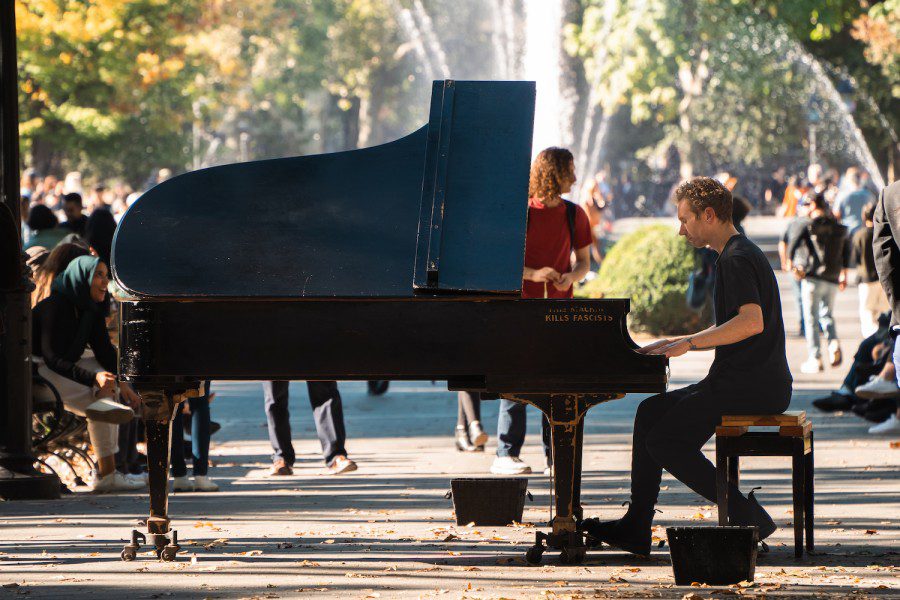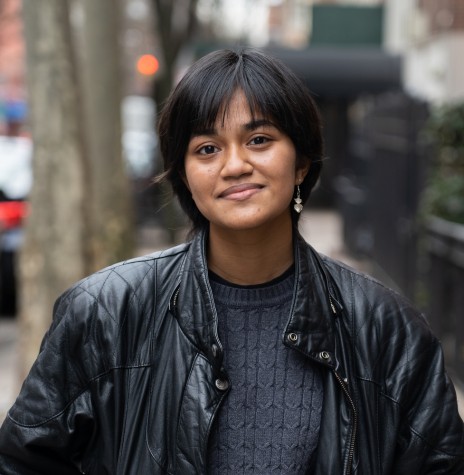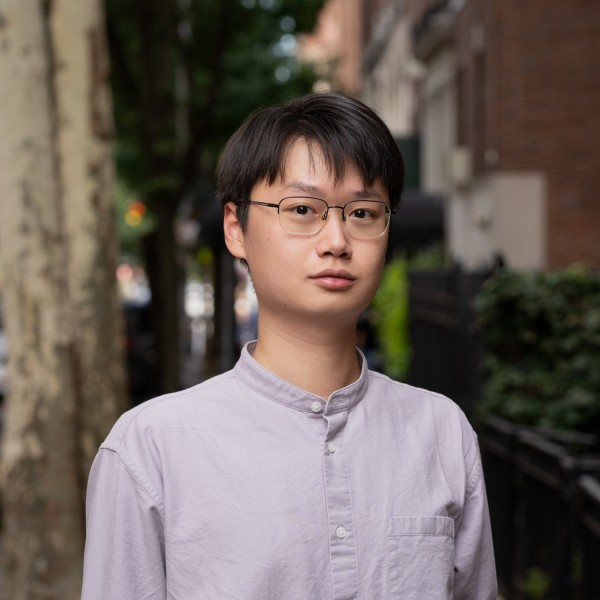Washington Square Park piano man may leave NYC
After 20 years of street performances, the Washington Square Park classical pianist, who became houseless earlier this year, faces uncertainty regarding his future in the city as winter approaches.
Colin Huggins plays piano in Washington Square Park earlier in October. (Courtesy of Kevin Wu)
December 1, 2022
While walking through Washington Square Park, you’ll be greeted with a symphony of sounds. The ubiquitous chatter of voices, the falling cascade of the fountain, and of course, the captivating performances of Colin Huggins, the classical pianist known as the piano man of Washington Square Park. But while Huggins has come to be cherished as a cornerstone of the park, the compounding effects of COVID-19 have left him uncertain of his future in New York City.
At the beginning of the pandemic, Huggins followed protocol and quarantined, but in doing so, he couldn’t regularly perform. By the summer of 2020 — around the end of the quarantining period — he only had enough savings to last him roughly a year and a half. This experience, combined with pressures from his landlord and loved ones to leave his apartment to avoid accruing more debt, prompted him to move out a year later.
“When the moratorium was going to be lifted, I called my landlord and I said, ‘I’m leaving. I don’t want to have to fight, I don’t want to be going to housing court every morning to fight for this place,’” Huggins said. “If I moved out, my landlord said he would forgive the debt, which was a lie because as soon as I moved out, he started harassing me and my parents for rent money.”
Several months afterward, Huggins sublet apartments or periodically stayed with his parents. But around the end of this past August, he became houseless.
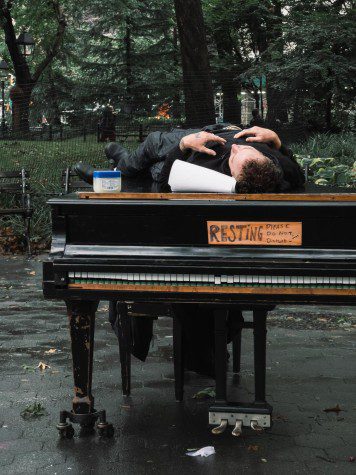
“It’s one of the most challenging things I’ve ever done in my life,” Huggins said. “I’ve learned so much from it, but at the same time, I’m still not entirely sure why it’s happening to me when I look at how many available spaces there are in New York, and how much time I’ve spent trying to understand how to be a positive influence on a space, or an environment, or group of people or one person.”
When Huggins first came to New York City in 2003, he worked as a ballet accompanist for the American Ballet Theatre and the music director for the Joffrey Ballet School. After three years, Huggins left these jobs, seeking to connect with people and exchange emotions through his music, which he found possible through street performing. For nearly 20 years, Huggins has been playing his piano on the streets of New York, with 16 of those years spent in Washington Square Park.
“Playing music for people is what’s gotten people to be open to accepting me into their lives,” Huggins said. “And street performing especially is what has brought people and my weird state of being into harmony with one another, so we can relate to one another, and it makes me feel happy. It makes me feel less depressed, it makes me feel like I’m surrounded with love rather than neglect and misunderstanding.”
Quentin Pompliano, a senior at Steinhardt, started a GoFundMe for Huggins earlier this year, and believes NYU students have a responsibility to be cognizant of his situation.
“He’s one of us, just trying to make it in the big city,” Pompliano said. “He provides so much value and happiness to listeners, passersby and beyond.”
Pompliano first met Huggins in late August, and after talking to him, reached out to building management at 35 W. 4th St., asking if Huggins could store his piano at NYU’s Steinhardt Education Building so he wouldn’t have to sleep with it every night. The request was denied, with management citing a lack of space and non-NYU students not being allowed in university buildings.
“I personally thought this was a little stringent and showed a general lack of empathy towards our community members,” Pompliano said. “After all, Washington Square Park is NYU’s campus, and the people of it are our community members. Colin has been playing in the park for more than a decade — probably closer to two — and he is an integral part of the community in the park.”
In his time at the park, Huggins has had countless interactions with passersby and NYU students. He has been able to find a network of listeners who enthusiastically support him, albeit that being a small community.
“Some of my listeners are tremendously supportive and they themselves are not in the best financial situation, and when they are supportive of me, I appreciate it so much,” Huggins said. “I would say, unfortunately, they are the minority. I’d say that that’s about 10 [to] 15% of my audience. And everybody else is a bit distant, and almost skeptical.”
Because of Washington Square Park’s proximity to NYU, street performers like Huggins often face similar situations not just with the general public, but with NYU students specifically.
“Tons of NYU students have been playing my piano out in public when I take breaks, and it got to where the piano was just beaten to death, and it doesn’t really play very well right now, and it needs probably $500, $1,000 worth of work to improve,” he said.
Despite this, he doesn’t want to put pressure on students to help him out. Huggins enjoyed interacting with many of the students and hearing their performances, and understands why they may not have stepped forward to help him repair the piano.
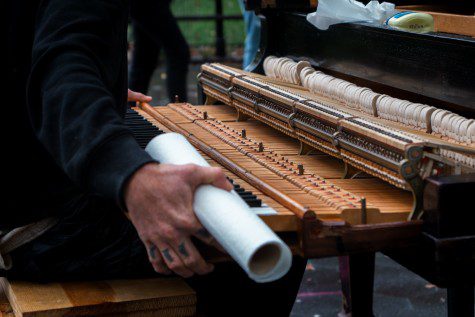
“It’s something that I equate to stress with the pandemic and feeling like it’s more important for them to look out for themselves, and for me to look out for myself than for us to help each other, but it still hurts,” Huggins said. “I want them to find it in their hearts to help me and help continue something that they benefited from, that gave their lives some vibrancy.”
Huggins has found that for the most part, people often gain a lot from his performances, but don’t necessarily give back. He doesn’t like requiring payments, though, as he can’t imagine denying someone who may be in need of his music simply because they cannot afford it.
“I have thousands of notes and messages and comments on Venmo transactions from people saying like, ‘Oh my god, this is the greatest experience of my life,’ or ‘This was a pivotal moment of my life, you’ve cured my depression,’” Huggins said. “And I feel like somebody who’s done that, who has that much proof that they could do this amazing thing, I feel like that person probably shouldn’t be homeless.”
But Huggins remains patient with the local community, and doesn’t place any blame or expectations on them regarding his current situation.
“I could say this could’ve been avoided if they had been supportive, but that would mean that I don’t like the state that they’re in right now,” he said. “And this is the state that they’re in right now, and I still love them. I’m not going to say things would be better if they blank. Things are what they are, and I’m going to do my best to make them even better.”
Huggins said that while it’s difficult for him to make any definite plan regarding the future, he’ll likely make a decision within the next two to three days. If he were to leave, he said he would most likely visit his parents’ place.
“New York City is the only place that I know as home,” Huggins said. “I’ll always end up coming back. But I have to make sure that I feel welcomed here, that I feel like something, some force of nature or some people want me here. It should be an easy decision, but I have moments that make me feel defiant, like no, this is my home.”
He noted the best thing the community could do at this time is to support him through donations, whether that’s through his Venmo or Patreon. Beyond donations, Huggins believes that the community needs to truly understand him and his role in the park if they wish to help him stay in New York City.
“The thing that would keep me here would be understanding that I’m really here to help,” he said. “I like to benefit the community, and I’d like to have a good life of my own, and I like to watch everything thrive. I want them to have a better understanding of who I am, that I’m not here to do anything that hurts anybody. I’m here to help the best I can and the way I’ve been helping people for years.”
While Huggins’ future in the park remains uncertain, one thing that won’t change is the long-lasting impact he has had on the city, and the relief he has been able to provide to many listeners. When asked if he had a message he’d like to leave with New Yorkers if he does leave the city, Huggins smiled and simply said, “Everything will be OK.”
Contact Adrita Talukder at [email protected].














































































































































